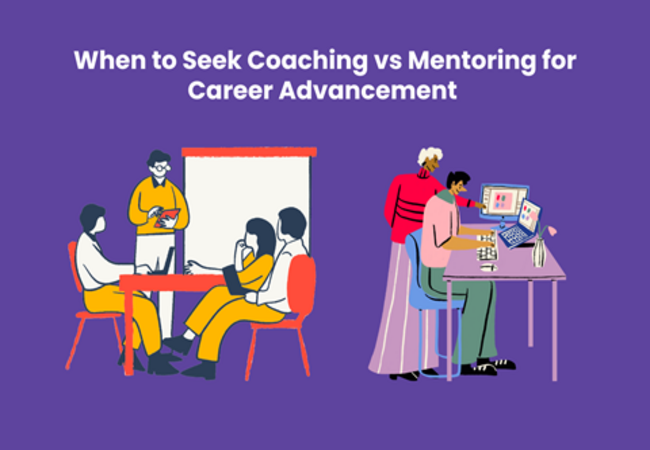When to Seek Coaching vs Mentoring for Career Advancement

Getting ahead in your job is often a twisting road full of choices about your personal and professional growth. Coaching vs Mentoring are two important tools that can make a big difference on this journey. To advance in your job, you must know the Difference Between Coaching and Mentoring and when to look for each. To help workers who are thinking about taking a Train the Trainer Course or other development chances, this blog will explain when teaching or mentoring is better for their job.
Table of Contents
- Understanding the Difference Between Coaching and Mentoring
- When to Seek Coaching
- When to Seek Mentoring
- Blending Coaching and Mentoring
- Choosing the Right Path for You
- Conclusion
Understanding the Difference Between Coaching and Mentoring
It’s important to distinguish between coaching and mentoring before delving into the circumstances in which each could be useful. Coaching is a time-bound, goal-oriented procedure in which an experienced guide helps an individual reach his or her full potential. The emphasis is on developing one’s abilities and knowledge to accomplish one’s professional goals and responsibilities. In this case, “training” is more appropriate than “guiding.”
On the other hand, mentoring is a long-term, interpersonal process. A mentor offers their expertise, experiences, and advice to the mentee. The mentor-mentee relationship emphasises the mentee’s overall professional and personal growth rather than any particular duties or areas of expertise.
When to Seek Coaching
- Skill Enhancement: Opt for coaching when developing certain professional abilities. If you’re taking a “train the trainer” course, for instance, a coach can assist you in perfecting your teaching methods and public speaking abilities.
- Performance Improvement: If you are having trouble meeting performance requirements or would like to perform at a higher level in your present position, working with a coach can help.
- Career Transition: The assistance of a coach may be invaluable when making a significant career change, such as moving into a new position or industry.
- Goal Setting and Achievement: In a professional setting, coaching is most useful for establishing well-defined objectives and working out a methodical strategy for achieving them.
When to Seek Mentoring
- Long-Term Career Planning: A mentor’s wide and long-term perspective is crucial for plotting out a professional future. Together, you can better handle the challenges of your field and prepare for the responsibilities and possibilities of the future.
- Networking and Relationship Building: Mentors typically expose mentees to their network, enabling them to create relationships with other professionals in their area.
- Navigating Workplace Challenges: Challenges in the workplace, such as office politics or career stagnation, can be difficult to overcome without the guidance of an experienced mentor.
- Personal Development: A good mentor will help you Coaching vs Mentoring grow as a person as well as professionally by encouraging you to strike a healthy balance between your professional and personal commitments.
Blending Coaching and Mentoring
Blending coaching and mentoring gives a holistic approach to professional development, catering to both immediate skill advancement and long-term career progress. This dual approach may Coaching vs Mentoring be invaluable in highly competitive fields where innovation and flexibility are essential.
Instruction on constructing and presenting courses is only one example of what might be covered in a training programme. These are concrete abilities that may be taught and honed under the guidance of a coach.
At the same time, a mentor can help you with the more macro parts of a career in training, including establishing your own unique brand, learning about Coaching vs Mentoring the latest developments in your field, and expanding your professional network. This guidance can continue even after class has ended, giving you the help you need to put your new knowledge into practice.
Combining coaching with mentoring helps you to get the short-term benefits of goal-oriented coaching while simultaneously reaping the long-term Coaching vs Mentoring benefits of mentoring’s experienced insights. The “how” and “why” of your professional development must become one.
Choosing the Right Path for You
Coaching, mentoring, or a hybrid approach should be purposeful and guided by your current needs and long-term goals. Determine your short-term goals first. Do they incorporate learning skills such as reading comprehension or computer programming? In this instance, coaching may be a very effective method of skill acquisition. Mentorship, on the other hand, is more suited if you want Coaching vs Mentoring more broad career coaching, such as how to assess the dynamics of your firm or plan your future growth.
Remember that your preferences may change in the future. When you’re just starting out, coaching may help you build important skills. When you’re farther along in your career and wanting to create a permanent impact on your business, having a mentor may be beneficial.
Also, think about how you learn best. Coaching is a good fit if you learn best when you have clear goals to work towards. Mentoring is a good fit if you learn best via Coaching vs Mentoring interpersonal interactions and sound advice.
Pursuing coaching, mentorship, or both should correspond with your personal and Coaching vs Mentoring Coaching vs Mentoring professional growth objectives. It’s all about balancing and securing your support to realise your professional goals.
Conclusion
Coaching and mentoring are both essential for professional development. To make the greatest selection for your personal development, you must understand the differences between coaching and mentoring. Examine what you require most at this point in your professional journey; whether you are in a Train the Trainer Course or at a career crossroads. Remember that the Coaching vs Mentoring right advice may make or break your path to success, so choose wisely and enjoy the journey of learning and advancement.

